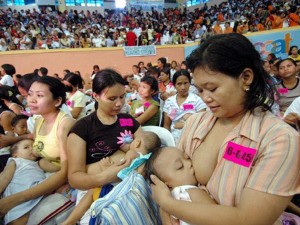The future depends on Mom’s milk, baby’s umbilical cord
The symbolic 7 billionth baby in the world has been born, and so baby Danica begins her journey in an uncertain world. But like all babies born in the past, and in the future, one question persists: How would the infant be given the best chance to a healthy life?

Hundreds of Filipino mothers breastfeed their babies at San Andres Sports Stadium in Manila, May 4, 2006. A total of 3,738 Filipino mothers simultaneously breastfed their babies breaking the Guinness world record of 1,135 set in Berkeley, California in August 3, 2002. Organized by the Manila city government, Children for Breastfeeding and the United Nations Children's Fund (UNICEF) aimed to promote breastfeeding in the Philippines. AFP FILE PHOTO
Science has proven that human mother’s milk ensures optimal immunity to a child that could last well into old age, a fact that no artificial infant formula can match. As nutrition experts have pointed out, breastmilk contains all the ingredients to help develop a baby into an intelligent citizen, armed with the best defenses to stave off infectious diseases and chronic illnesses, disorders, allergies, even diabetes and obesity.
Breastfeeding advocates stress that breastmilk is the only perfect food for infants and the only perfect milk for children. The World Health Organization and Unicef recommend that infants should be exclusively breastfed for the first six months of life to achieve optimal growth, development and health, after which the child should be given nutritionally adequate and safe complementary foods, with breastmilk still being the staple even beyond two years of age.
Medical research and development has found a perfect one-two weapon against a child’s future dread diseases. One is breastmilk, the other is umbilical cord blood.
Painless procedure
Cord blood banking is a painless procedure that experts claim does not affect the safety of the mother and the baby. It involves storing hematopoietic stem cells, known as the building blocks of the blood and immune system, and these are collected from the umbilical cord linking the baby to its mother immediately after birth. These stem cells possess the increased ability to adapt, revitalize and replenish the blood and immune system by developing into red blood cells, white blood cells and platelets.
Proponents of cord blood banking cite research that show the potential of stem cells to help treat diseases such as cerebral palsy, anemia, leukemia, lymphoma and other cancers. They also point to ongoing clinical trials worldwide involving the use of stem cells to treat juvenile diabetes, brain injury, stroke, heart and liver disease, eye disorders, spinal cord injuries and auto immune disorders, as well as for cartilage regeneration.
Cord blood banking advocate Dr. Arvin Faundo, a consultant for blood and marrow transplant at the Asian Hospital and Medical Center, explained that “the stem cells from the cord blood, which are used for transplants as standard treatment options for patients with leukemia, are immature and still do not have the so-called ‘memory cells,’ making them ideal for treating patients with various diseases.”
Newborn screening
Despite the promise of breastmilk and cord blood banking, we cannot fight what we cannot see. This is where newborn screening comes into play. It involves testing and screening newborn babies for a congenital metabolic disorder that may lead to mental retardation and even death if left untreated. The procedure involves a few drops of blood taken from the baby’s heel and blotted on a special absorbent filter card. The blood is dried for four hours and sent to the laboratory for testing.
“Most babies look normal at birth. Through newborn screening, we can identify the likelihood of the child acquiring life-threatening disorders, and thus, take appropriate and immediate actions to prevent those diseases,” said Dr. Ma Cecilia Alinea, a clinical associate professor of the Department of Pediatrics of the University of the Philippines-Philippine General Hospital.














